Kevin Barnes is the mastermind behind the indie pop band of Montreal, which got its start as part of the Elephant 6 collective that spawned other notable bands including Neutral Milk Hotel, Olivia Tremor Control, and The Apples in Stereo. The latest addition to the band’s diverse catalog is last year’s Lousy With Sylvianbrian, which tilts in a more straightforward rock direction, making it arguably one of the band’s most accessible recordings.
This interview was done by phone on 1/9/14, and was for a preview article for the of Montreal show at The HUB at the University of California, Santa Barbara on 1/24/14.
Jeff Moehlis: What can we look forward to at the upcoming show?
Kevin Barnes: We’re going to play a bunch of songs from the last five records, try to mix it up and do some different things. It should be a fun night.
JM: The band is known for the theatrical element. What led you in that direction?
KB: I guess mainly just feeling like I wanted the show to be a special event, and not just a typical rock ‘n’ roll experience. I have a great appreciation for artists like Kate Bush and Peter Gabriel and David Bowie, you know, people that put a lot of time and effort into creating a happening, as it were. Something that is extraordinary and feels almost like a holiday, a very special day. For me, I want every show to feel like that, like a holiday.
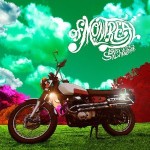
JM: You had a new album [Lousy With Sylvianbriar] come out recently, and unlike most other of Montreal albums it was recorded in the studio with other musicians. How did that affect the final product, rather than doing it yourself?
KB: It definitely created a new atmosphere. That was really the goal for me. For every record, I want it to be different from the one before, and all the other ones, too. I want each record to have its own strong identity and personality. I made most of the last records over the last six years by myself, just piecing things together one instrument at a time on my computer. If I had someone else play on the record, I usually emailed them a mix and they would do it in their own studio and email it back to me, so it was really disconnected.
With this record I wanted it to feel more communal, and more impulsive and spontaneous, and capture an energy in the room with a group of people and a specific period of time, something that could never be duplicated. So, basically that was the vision, to get a group of people together and make the record very quickly. We did it in about two weeks, and just sort of knocked it out. We made all of our creative decisions on the fly, and didn’t overanalyze anything or second-guess anything too much. We just sort of dove in and knocked it out. So it was really fun. It was very refreshing in a way, to work that way.
JM: Is the band that recorded with you basically the same band that will be touring?
KB: Yeah.
JM: In your opinion, how does of Montreal fit into the musical landscape of 2014?
KB: I think on a certain level we’re sort of on an island. We’re not really a part of a scene, necessarily, and we’re not really part of whatever trend is happening right now. I think that we’ve kind of formed our own little niche in the world, and sort of exist there.
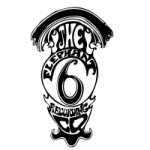
JM: There’s a certain mythology that’s developed around the Elephant 6 Collective. I know that this is ancient history for you, but how did your involvement with that group of people improve and/or limit what you were doing with your music?
KB: In the early days, when there actually was an Elephant 6 to speak of… and I guess there is now because Neutral Milk Hotel is back on tour and Elf Power is opening for them, so it’s like 1997 all over again. At the time it was great because I had moved up from South Florida where there was basically no music scene to speak of, and there’s Athens, Georgia where there are all these people making home recordings and listening to Sixties psychedelic pop music, and playing on each other’s records and just hanging out. All of the sudden I had this great support group and this great group of people to be inspired by, and encouraged by. It was wonderful.
To see bands like Olivia Tremor Control and Neutral Milk Hotel establish themselves in a very grassroots way was also really empowering, to realize that you don’t need to sign to some major label. You don’t need to worry about MTV or any of that shit. You can just do it on your own, make your own rules and develop it in this really organic way. To see them go through what they had to go through to get to where they were, having to play all these shows, go on tour, and sleep on people’s floors, eat Taco Bell or Subway every day for a month because you can’t afford anything. That was the life.
If of Montreal was the only band doing it, maybe I would have felt a little more insecure about it. “God, I’m such a loser.” But seeing all these other bands that were doing the same thing – we’re all struggling, we’re all starving artists or whatever – you wouldn’t feel like an alien, you’d feel like a part of a movement, which was great.
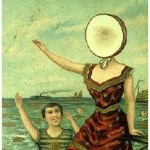
JM: Have you had a chance to see Neutral Milk Hotel since they reunited?
KB: I saw Jeff [Mangum] solo about a year or two ago in Athens, and that was great. I haven’t seen them with the full ensemble, or with the full backing band or whatever.
I’ve heard great things about it. I mean, I’ve seen them play countless times back in the day. I feel a bit spoiled because I saw them so many times. It’s a legendary line-up, a legendary group. I think it’s great that they’re taking it back on the road.
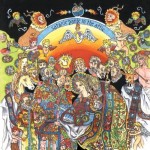
JM: My favorite of Montreal album is Satanic Panic in the Attic, which is now I guess ten years old. Do you have any reflections on that particular album, you know, where your mind was at and so on?
KB: That was a very important record for me because the band that I had up to that point had sort of splintered apart, and I had just gotten married. All of the bandmembers used to live in this big house together out in the country, and we decided to move out of that house. Me and my wife and my brother moved into this little house together by this train track. So it was a transitional period, or a new chapter, whatever you want to say. I didn’t really know what was going to happen with the band, or with my life, or anything. Everything was in transition. So that record was great, to be able to experiment with different thing and incorporate drum programming and synthesizers and dance influences. That was basically the beginning of a new direction for me stylistically.
JM: I know you don’t typically perform songs from your older albums like Satanic Panic in the Attic. Why don’t you perform those?
KB: To be honest, maybe I’m like a lot of artists where I get very excited about the new thing, and then within a couple of months it doesn’t feel as exciting anymore. I’m excited about the next new thing. And so the more years that pass, the less interest I have in my record. I can appreciate them on a certain level, and I feel like they came from a pure place and all that. For some of the songs, it would be a bit awkward or would feel weird. I would never write them now. You know, I’m in such a different headspace now. When I think about performing a song like “Vegan in Furs” or “Climb the Ladder” or “How Lester Lost his Wife”, it’s kind of like, hmmm, it doesn’t feel like me anymore. It would be like a cover song or something. It’s a weird thing in that way. I mean, some songs do still work for whatever reason. A song like “Rapture Rapes the Muses” or “Disconnect the Dots” would still work and still feel cool. So we might try to do one of those songs.

JM: I noticed that a few years ago you collaborated with the Brazilian band Os Mutantes. What was that experience like?
KB: I mean, I love them. Their first couple of records are some of my favorite records ever. So it was definitely a thrill. But at the same time I wasn’t, like, in the same room with anybody. I did the basic tracks to the song and them emailed it to the guitar player and he did a guitar solo. So it wasn’t like this amazing experience in that sense. But it was cool, just on some tiny level to connect with them.
JM: Have you ever met them?
KB: I never have, no. And I’m kind of weird in that way. I’m not really that interested in meeting my heroes. I think you just have such high expectations and it would inevitably be a letdown. People are just people. You think that they’re amazing, and you get so excited about their work, but they’re just people. They may be a bit grumpy, or whatever. It’s just like, what’s the point? You have really nothing, you’re not friends. They don’t know you at all. They might be nice or they might be grumpy, but it doesn’t matter. The music is enough. I don’t really care to have a personal relationship.
JM: What advice would you give to an aspiring musician?
KB: The only thing I can really say is to believe in yourself. If you receive fulfillment from the creative process, don’t let anyone tell you that you’re bad or that you’re wasting your time or that you should focusing on something else. If that’s the thing that you love the most in life, then just do it and don’t worry about how it’s perceived by the outside world.
It’s almost like an affliction. If you’re passionate about something that doesn’t really help you, it doesn’t help you pay the bills or whatever, but it’s your main obsession in life and you can’t do anything else… I think of all these people like Philip K. Dick, for example, eating dog food in some shed just because he can’t really do anything but write. In a way, it’s like an affliction, because he’d be better off, not the world would be better off, but he’d be better off at a personal level if he gave up writing and became an accountant or something. You know, more dependable work, more consistent income. But there’s a lot of people like that. I just finished reading this Malcom Lowry book Under the Volcano, and he had a pretty crazy, self-destructive life. Terrible alcoholism and madness and all that. There’s so many people like that, but their work is just so fantastic and timeless, and it still touches people decades later. So it’s kind of a trade-off.
Advice for an aspiring artist? There’s no advice, really. You do it as long as you want to do it, and as long as you get some fulfillment from it. When you stop, then you stop.
JM: Do you want to set the record straight on anything about your career? Any misconceptions floating around that annoy you?
KB: No, the thing is that I move so quickly and change my mind about things so quickly and my perception of things. A thing that might annoy me is just natural, because people aren’t sharing my inner dialog twenty-four hours a day. People will have this concept of of Montreal, a certain thing that’s a dead thing. I mean, it did exist at one time but now it doesn’t exist anymore, but people think that’s what you are. This thing that existed three years ago, or six months ago, or whatever.
But it doesn’t really bother me. It’s kind of funny in a way. I had this realization. With each record I basically get into this state of mind where I’m totally consumed by the spirit of something. It could be the spirit of George Clinton, or the spirit of Edward Gorey, or the spirit of Leonard Cohen, or whatever it might be. That’s the thing that’s directing the ship, in a sense. And somehow I just expect everyone to know that. But of course no one knows it.
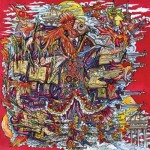
So, with False Priest I felt like I was making a Funkadelic record, and then it comes out and they’re reviewing it, and it’s not a Funkadelic record. Because, of course it’s not [laughs]. It’s some white guy alone in his little bedroom studio making this record, and he thinks it’s a Funkadelic record but it’s not obviously. And I forget that sometimes. I’ll read a review and I’m like, “What the fuck are they talking about? This is a fucking Funkadelic record. But wait, it’s not. Oh, I’m insane.” They don’t have the context. They can’t understand. So that’s a thing. I’m not being fair about it. If a journalist doesn’t get the reference points, doesn’t put it in the proper context, then they’ll perceive it all wrong.
And that’s true of just about every record I’ve made, because I always want to change, I always want it to be different, I always want it to be observed from a new perspective, not in the context of my catalog. I do something brand new, as if it’s a brand new artist. But that’s way too much to ask. There’s just so many bands putting out records, and there’s just too many bands, too many albums for these people to invest that much time or thought into the reviews.
JM: What are your plans for the near future? Are you writing new songs, is there a new album in the works?
KB: Yeah, I’ve started writing a new album. I have about five songs that we’ve recorded, so we’re about halfway through the next record.
JM: Where is your headspace at for this upcoming album?
KB: Well, musically it’s hard to say. It’s still kind of in the spirit of the last record. But I don’t want it to just be a carbon copy of that, so there’s a lot of other stuff… The record I made was on a tape machine, and it was all live tracking. This record is similar in that way, but I want to become a bit more experimental in the studio again. For the last record, I was trying to make this pure sounding, straightforward lyric-driven record. I didn’t want the music to be too ornamental or too distracting, because I wanted the main focus to be the voice and the lyrics. For this record I’m getting back to thinking orchestrally, trying to make something interesting orchestrally speaking. So a lot of focus on the lyrics and the voice, but trying to include some elements that weren’t there on Slyvianbriar.
Another thing, working on a tape machine, it’s such a great challenge to try to make something that sounds interesting and exotic or whatever. With a computer it’s all there in the box, and you just do a mouseclick and everything turns glorious [laughs], but with an analog tape machine you’re just building it. You’re like a carpenter. If you want the tiles in the bathroom to look amazing, you can’t just push a mouse button down and make the tiles look awesome. You actually have to go somewhere, do some research, figure out or make your own tiles, or whatever you have to do. That’s really what is exciting to me. The sounds that I get, no one else can get. When you’re working on the computer, if you’re using plug-ins that anyone can get or samples that anyone can get, and all these things that anyone can have, then the music can become a bit homogeneous, especially if you rely too much on that.
And it’s really easy. That’s the thing, it really easy. You can make really fantastic recordings and don’t really have to be a musician, or be competent on any instrument. You can make something really fantastic if you have a good imagination. That’s cool, and that’s what I love about computer recording. At a certain level I felt like it was too easy. It wasn’t enough of a challenge. I wanted to go back to the tape machine because it’s nothing but a challenge, really. If you want the piano to sound cool, you have to be a good piano player [laughs]. There’s no hiding anything. You can’t pretend to be something that you’re not with a tape machine. I think it’s really cool. That’s what I feel is sort of missing in music. Everything is so “perfect”. All the vocals are pitch corrected, and all the tempos are to the grid, and everything is so precise. It just sort of loses that human element that I love. I never really listen to contemporary music because it all is kind of too perfect. I like the flaws.
There’s also such a higher level of musicianship in the Motown recordings and the Stax recordings, the things that people did back in the day. Because if you wanted to sound great, you had to be great. But now if you want to sound great, you don’t have to be great. It’s too easy now.
I don’t want to be a snob about it. I think it’s cool that technology makes music more accessible for people. But at the same time, I think it could have a bad long-term effect. It’s like, you can take a really awesome looking photograph with your iPhone, and it looks really arty and cool. And you didn’t develop it yourself, you know nothing about cameras or film or lightning. But you can make something that looks pretty awesome. It could potentially kill the artform. It becomes so accessible to everyone, and no one is special anymore. I think it could have a detrimental effect.
JM: What is the status of the documentary Song Dynasties [about the band of Montreal]?
KB: It’s coming together. I know that the director was hoping that it would debut at South By Southwest this year. That’s his goal, and I think he’s pretty close to reaching that goal. So hopefully it’ll come out by spring or summer this year.
JM: From the source, for the bandname “of Montreal”, should “of” by upper-case or lower-case?
KB: Lower-case.
JM: I thought so, but you see it both ways.
KB: There’s always someone who doesn’t know or hasn’t paid attention. It would seem like it should be upper-case, but aesthetically I just think it looks cooler lower-case.
JM: Where are speaking to me from?
KB: I’m in Athens [Georgia] right now.


Discussion
No comments for “Interview: Kevin Barnes”